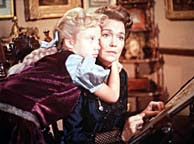Pollyanna Grows Up
 I was flipping through the channels the other day and there it was. A movie that my kids wouldn’t be caught dead watching, but which I am perfectly content, nay happy, to rewatch on an endless loop. It’s not Hitchcock, Scorsese, or Coppola. It’s pure, unadulterated, treacly sweet Disney: Pollyanna starring Hayley Mills.
I was flipping through the channels the other day and there it was. A movie that my kids wouldn’t be caught dead watching, but which I am perfectly content, nay happy, to rewatch on an endless loop. It’s not Hitchcock, Scorsese, or Coppola. It’s pure, unadulterated, treacly sweet Disney: Pollyanna starring Hayley Mills.
While it was the American debut of Ms. Mills, the movie also starred old Hollywood favorites like Academy Award winners Jane Wyman and Karl Malden, and the ever-brilliant Agnes Moorhead.
Watching this movie is like eating a grilled cheese sandwich, followed by chocolate pudding served in an old, blue custard cup. It’s visual comfort food that takes me back to a quieter, gentler time – even if in my heart of hearts, I know that period in my life wasn’t ever quite as calm or as kind as I remember.
There’s a sweetness and simplicity to the Pollyanna story. A poor orphan girl comes to live with her rich, cold aunt, and with innocent goodness transforms a whole town. Pollyanna doesn’t need years of therapy having lost both her parents at an early age. She isn’t haunted by demons or bitter about being forced to live in an attic by an uncaring guardian. When she falls and is paralyzed, her hair is immaculate. When the doctor picks her up to take her to Baltimore for delicate spine surgery – there are no backboards to immobilize her body, just Doc Chilton tenderly carrying her in his arms to the train station. Little Jimmy Watson is adopted by old man Pendergast (bravo to the incomparable Adolphe Menjou), and there’s no home inspection by social workers. For that matter, Pollyanna at 12, still wears pigtails, has no body piercings, and her greatest joy is to win a doll in a carnival game. It’s not even an American Girl or Bratz doll.
There is, thankfully, no gritty realism in this movie. Maybe it’s a cop-out, but Pollyanna is the perfect antidote, at times, to my troubled world vision. It’s refreshing to believe that we should always look for the good in our fellow man. It’s comforting to think that sheer decency can make an enormous impact. It’s heartening to believe in the power of an individual to effect change.
Carolyn Hart has explained that she likes to write traditional mysteries because “the good guys always win.” Me too. I can’t control much in this world. But just like in Harrington, the “Glad Town,” in the universe I help create of Mac Sullivan, Rachel Brenner, and the Irish wolfhound Whiskey, the good guys always win.
Evelyn David
